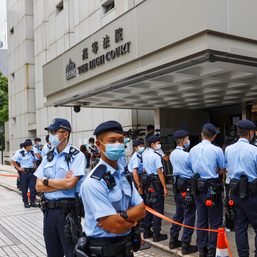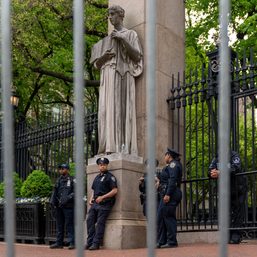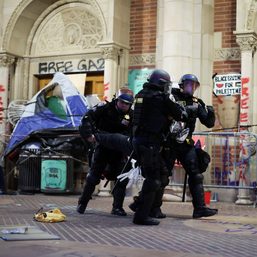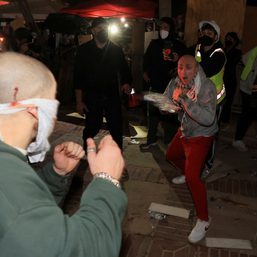SUMMARY
This is AI generated summarization, which may have errors. For context, always refer to the full article.
![[OPINION] Reflections on the culture of protest in France](https://www.rappler.com/tachyon/2023/08/france-protests-aug-1-2023.jpg)
On June 27, I was wrapping up my fourth month of traveling around Southeast Asia when the loud echoes from the violent riots, following the fatal shooting of 17-year-old Nahel by a police officer in a Paris suburb, threw me back into the reality of a world of disarray I momentarily stopped seeing while I was enjoying the wonders of backpacking.
The publicly shared video recording of the shooting of the boy fueled the anger of thousands of French people who held violent protests for seven consecutive nights.
I was looking at my country burn once more, but this time, distance gave me space to reflect back on the culture of protest I grew up with.
In the time that I have been away from France, I have often been asked, “Is it true that French people like to protest?” The short answer is, yes, people take their political grievances out on the street as common practice, but no, people don’t like to protest because if everything was right then they wouldn’t need to march on the streets. Who will hear you if you don’t scream? What will change if you stay seated? That’s the memo ingrained in French culture.
During my high school years, the best news most students could receive were the early morning rumors that we students were going on strike before class started, because, most of the time, we didn’t agree with whatever new reform concerning education or climate change actions were voted. The thrill of watching your friends run to you with a smile on their faces as they scream that we are going on a school strike, when you step out of your 8 am bus ride, is unmatched. Students gathered in front of the school doors where a pile of garbage bins, amassed by the most devoted among us, created a blockade to keep students from entering the establishment (a staple element of school protests), while the crowd came up with a new chant which would resonate in the streets for the upcoming hours.
These morning school strikes were the initial phase of a long day of protest. In the afternoon, thousands of students, who pulled the same stunt in their schools, huddled at the chosen meeting place and marched together.
The excitement of protesting in Paris tends to awaken a collective infatuation that drives crowds of people to join, some of whom unfortunately, like protesting. These opportunistic rioters are often groups of friends who get pulled in by the crowd effect, without necessarily sharing the protest project, and enjoy participating in demonstrations for the sole purpose of breaking things. Commonly referred to as casseurs (breakers), they immerse themselves into the crowd and use its momentum to break shop windows, steal from stores and burn cars on the sidelines of demonstrations.
Growing up in the center of Paris, a protest hotspot, I witnessed over the years the growing frustration of shop owners and police authorities as I watched them barricade shop windows with thick wood panels in preparation of expected escalations on demonstration days. The increasing violence used by these casseurs over the years, shifted the dynamic of protests in France to increasing violence.
On July 14, 2019, I was strolling down the famous Champs Elysées avenue in Paris with a couple of friends, when we noticed an unusual amount of police officers on the streets. That night, the Algerian football team had won a game that would secure their spot in the finals of the Africa Cup of Nations. This win was widely celebrated by the French Algerian community in France. As supporters started pouring down the avenue waving colored smoke and Algerian flags, I realized that every connecting street was closed off by police roadblocks. One of my friends got excited because it was his first demonstration, and when you’re Parisian, participating in a protest is an unspoken rite of passage. All I saw was no way out. Authorities were locking us in their man-made paddock where we would end up getting tear-gassed or stomped on if we stayed any longer. I look at my friend, told him that there is no reason to like this, and walked around (never run) negotiating with policemen to convince them to let us out.
The “overflow” describing the violent actions of football fans was later reported by the media, while all I remembered from that night was being trapped and scared because police officers kept declining my right of passage when I tried to leave the avenue as tear gas was being thrown at a crowd of peaceful and cheery supporters.
The reality of our culture of protest in France is more complex than a “yes” or “no” question. The feeling of impunity for rioters who do great damage to private and public property and the disproportionate use of brutality by police officers are a lingering bane that often shadows protesters’ motivation to protest in the first place. Today, most demonstrations in France, whether they are outbursts of joy or anger, turn into a game of cat and mouse between police forces and protesters, at the expense of peaceful protesters whose voices are muffled by the sounds of shattered glass, journalists who get blinded by tear gas and local citizens who inexorably watch their cars burn into flames. – Bonnie White/Rappler.com
Bonnie White is a Rappler volunteer. She grew up in the heart of Paris, France, in the protest hotspot. Moving across the world to New Zealand then backpacking in Southeast Asia has given her time and space to reflect with hindsight on her past life in France as part of her identity quest.
The views expressed by the writer are his/her own and do not reflect the views or positions of Rappler.
Add a comment
How does this make you feel?
![[Edgewise] Authoritarian mass delusion puts US democracy at risk](https://www.rappler.com/tachyon/2024/06/authoritarian-mass-delusion-us-june-18-2024.jpg?resize=257%2C257&crop_strategy=attention)




![[OPINION] A rebellion long overdue](https://www.rappler.com/tachyon/2024/06/mass-uprising-matrix-june-4-2024.jpg?resize=257%2C257&crop_strategy=attention)




There are no comments yet. Add your comment to start the conversation.